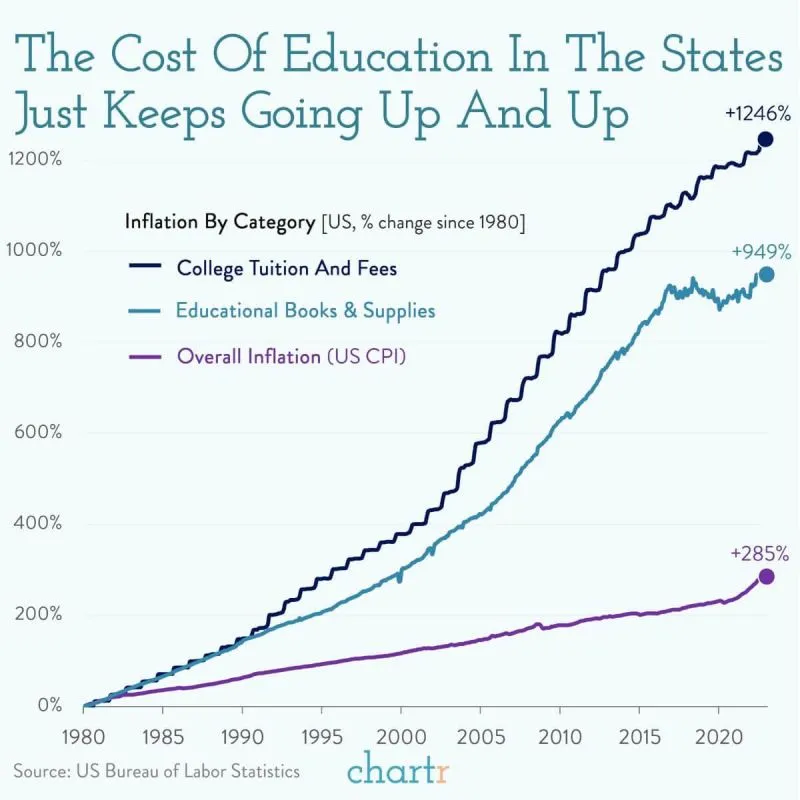|
Getting your Trinity Audio player ready...
|
This post originally appeared on ZeMing M. Gao’s website, and we republished with permission from the author. Read the full piece here.

According to the U.S. Bureau of Labor Statistics, in the last 40 years, the U.S. CPI-based overall inflation was 285%, while the cost of higher education increased by 1246% (that is 12.46 times higher, about 4.4 times higher after inflation adjustment).
From a financial point of view, higher education is clearly a broken system.
But there’s more to this, pointing to even worse problems.
First, it is a wealth redistribution problem, as Steven Herzberg pointed out:
“It’s merely a way to reallocate wealth to university endowments. It’s accomplished by U.S. Gov’t guaranteeing student loans so these students can pay higher fees that results in profits that pass through to University endowment funds. Rather than the U.S. Gov’t forgiving student loan debt, perhaps we should force academic institutions to pay those student loan debts from the endowments that were created through this debt scheme.” – Steven Herzberg, comment on LinkedIn.
That is very true, but still just a part of the problem. University endowment funds are huge but still just a leftover and a deposit of an even much greater consumption and production system, which is the higher education system itself.
College is increasingly a waste of time
The truth is that, with the decentralization of information, an increasingly greater percentage of higher education is unnecessary.
I would say a minimum of 50% of the college education today is a waste, and we are approaching even higher percentages quickly, perhaps even to a point where over 90% is a waste in the near future.
No, I’m not saying people should stop educating themselves after high school, but quite the opposite.
Nor am I saying that we don’t need teachers. The teacher-student relationship is the very basic element of the entire human knowledge system, and teaching by individuals who possess knowledge will not only always be necessary but will always be a critical and honorable part of human society.
But college is clearly proven itself to be an extremely inefficient way to learn. Not only is the classroom teaching and the learning itself inefficient, but more importantly, most programs and information offered in colleges are useless, failing to produce more knowledgeable, more productive, and healthier individuals.
An even worse problem
But even that is not the biggest problem with today’s colleges and universities.
The modern higher education system is far worse than being just an inefficient knowledge transmission system, but rather an extremely biased kind that filters human knowledge through a special filter such that just a certain type of knowledge (biases really) is distilled to achieve a concentration in universities many times higher than that in the society at large.
The higher education system is, therefore, far worse than a straight financial problem, worse than even a much deeper wealth redistribution problem, but rather a systemic information pathway problem that has a profound impact on the very substance of humanity.
If looked from the perspective of the above latter (i.e., the systemic information pathway problem), the out-of-control education cost inflation is actually a good thing in a painful way because it is showing an obvious (both visible and easily felt) symptom of an otherwise hidden cancer, to wake people up to find a cure earlier. The worst kind of cancer is the type that doesn’t show any symptoms until it is too late.
In this sense, the government cancellation of student loans works as a painkiller to mask the symptom and to make the problem much bigger than it is necessary to call for a cure.
There is no market equilibrium in higher education. You cannot find a more distorted market than this. And the hands of the government magnify the distortion.
Clearly, a different kind of education system and teaching is necessary.
A solution is emerging
Yet a real solution is silently emerging from the free market. The free market based on human ingenuity always has a surprise to offer.
It is a different kind of learning and teaching. It is far more decentralized, compatible with the decentralization of information itself. See more: the New Internet.
Fundamentally, education is a system that passes knowledge down the timeline of humanity. Far more efficient pathways are becoming available today, making traditional college education less and less necessary. All information one can learn in college and beyond that can be found outside the traditional classrooms and, in most cases, with the highest quality. It is not only the Internet that contributes to this, but also the fact that more and more institutional knowledge is digitized and easily accessible to individuals who participate. And with the form of employment itself being decentralized, the economic participation is no longer limited to full-time employees nor even traditional contractors.
And learning can be done in such a flexible way that one does not need to separate several years of his life into a place called ‘college’ to learn, but may engage in various purpose-driven learning programs, small or large, part-time or full-time, all depending on actual needs and learning dynamics.
And this is already happening without even proper financial incentives for better production and marketing. It is unfortunate that the ‘free’ Internet has conditioned people’s minds into a freemium data economy that society is unwilling to pay for valuable information. Just imagine how much better it would be with the right kind of decentralized education with the right incentive economics.
Paradoxically, people are willing to, being forced to really, pay hundreds of thousands of dollars for a few years of college. It is an indication of a need, not proof of a solution.
This is the state of the current reality. It’s hard to predict when the higher education system will crumble down to give place to a better system. The inertia of a large, lifeless corpus itself can be huge but can be much worse when it is motivated by human nature and reinforced by ignorance. The self-reinforcing accreditation, assessment, and social acceptance of the current system has a long life ahead.
But the force of innovation is unstoppable. More and more people will start to think out of the box and will soon find a solution that is already there. Some will do it because they are brave, but more will do it because it is necessary. And society, in the form of employers and social circles, will also start to understand the true meaning of education and find ways to assess and accept real knowledge and skills in a more objective way. A reality is found even under a bubble like the higher education system. And the reality always prevails.
Watch: Education—the first roadblock to IPv6 integration

 08-23-2025
08-23-2025 





